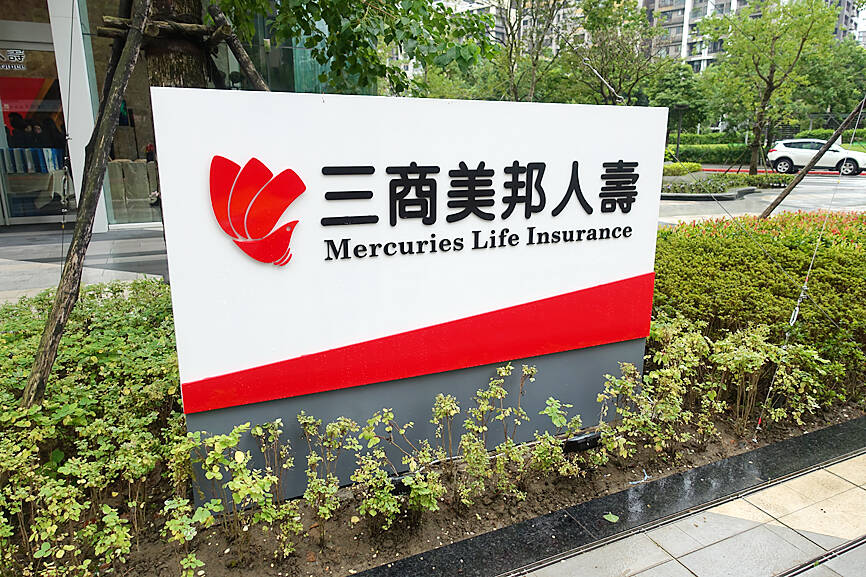Mercuries Life Insurance Co (三商美邦人壽) is considering options including a sale of the business, people familiar with the matter said, in what could mark further consolidation in the nation’s financial services industry.
The firm is working with advisers to gauge initial interest from prospective local and international buyers, the people said.
Shares in Taipei-listed Mercuries Life have dropped 17 percent this year, giving it a market value of about US$1 billion.

Photo: Wu Hsin-tien, Taipei Times
Another option could be selling a stake rather than the whole business, the people said, adding that considerations are preliminary and might not lead to a transaction.
Mercuries Life has been in the crosshairs of the Financial Supervisory Commission, which says the firm contravened rules after failing to implement a plan to improve its capital adequacy ratio.
It’s been told to complete the process by the end of this year and provide more details before the end of the month.
Mercuries Life said it aims to enhance capital and seek potential partnerships at home or abroad, and takes all options into consideration.
While the company is open to proposals from overseas, Chinese bidders are less likely, as they would need approval from multiple government agencies, which could block deals in sensitive sectors such as the financial industry on national security grounds.
Taiwan has been trying to lift the financial industry to make the economy less reliant on the technology sector.
Other major transactions in this industry include a merger between Taishin Financial Holding Co (台新金控) and Shin Kong Financial Holding Co (新光金控), completed last month, while Fubon Financial Holding Co (富邦金控) acquired Jih Sun Financial Holdings Co (日盛金控) in 2022.
Founded in 1993 and listed in 2012, Mercuries Life provides products including life, health, accident and other types of insurance, according to its Web site.

The number of Taiwanese working in the US rose to a record high of 137,000 last year, driven largely by Taiwan Semiconductor Manufacturing Co’s (TSMC, 台積電) rapid overseas expansion, according to government data released yesterday. A total of 666,000 Taiwanese nationals were employed abroad last year, an increase of 45,000 from 2023 and the highest level since the COVID-19 pandemic, data from the Directorate-General of Budget, Accounting and Statistics (DGBAS) showed. Overseas employment had steadily increased between 2009 and 2019, peaking at 739,000, before plunging to 319,000 in 2021 amid US-China trade tensions, global supply chain shifts, reshoring by Taiwanese companies and

Taiwan Semiconductor Manufacturing Co (TSMC, 台積電) received about NT$147 billion (US$4.71 billion) in subsidies from the US, Japanese, German and Chinese governments over the past two years for its global expansion. Financial data compiled by the world’s largest contract chipmaker showed the company secured NT$4.77 billion in subsidies from the governments in the third quarter, bringing the total for the first three quarters of the year to about NT$71.9 billion. Along with the NT$75.16 billion in financial aid TSMC received last year, the chipmaker obtained NT$147 billion in subsidies in almost two years, the data showed. The subsidies received by its subsidiaries —

Shiina Ito has had fewer Chinese customers at her Tokyo jewelry shop since Beijing issued a travel warning in the wake of a diplomatic spat, but she said she was not concerned. A souring of Tokyo-Beijing relations this month, following remarks by Japanese Prime Minister Sanae Takaichi about Taiwan, has fueled concerns about the impact on the ritzy boutiques, noodle joints and hotels where holidaymakers spend their cash. However, businesses in Tokyo largely shrugged off any anxiety. “Since there are fewer Chinese customers, it’s become a bit easier for Japanese shoppers to visit, so our sales haven’t really dropped,” Ito

OUTLOOK: Pat Gelsinger said he did not expect the heavy AI infrastructure investments by the major cloud service providers to cause an AI bubble to burst soon Building a resilient energy supply chain is crucial for Taiwan to develop artificial intelligence (AI) technology and grow its economy, former Intel Corp chief executive officer Pat Gelsinger said yesterday. Gelsinger, now a general partner at the US venture capital firm Playground Global LLC, was asked at a news conference in Taipei about his views on Taiwan’s hardware development and growing concern over an AI bubble. “Today, the greatest issue in Taiwan isn’t even in the software or in architecture. It is energy,” Gelsinger said. “You are not in the position to have a resilient energy supply chain, and that,